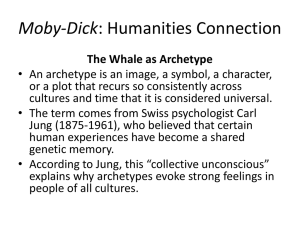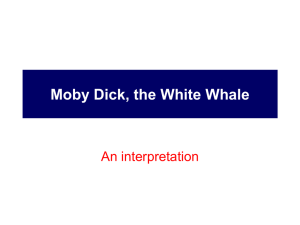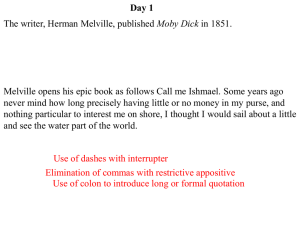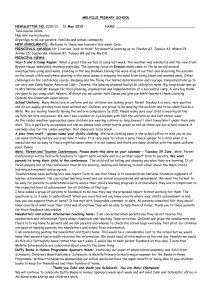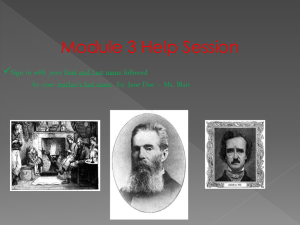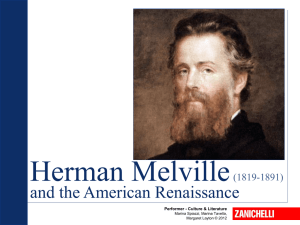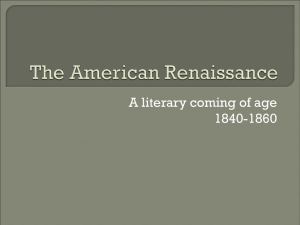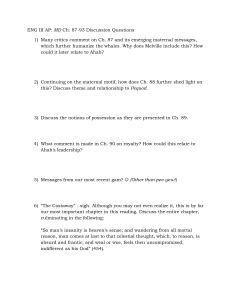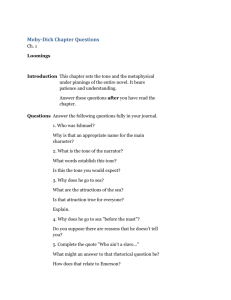File - Moby Dick Character Analysis
advertisement
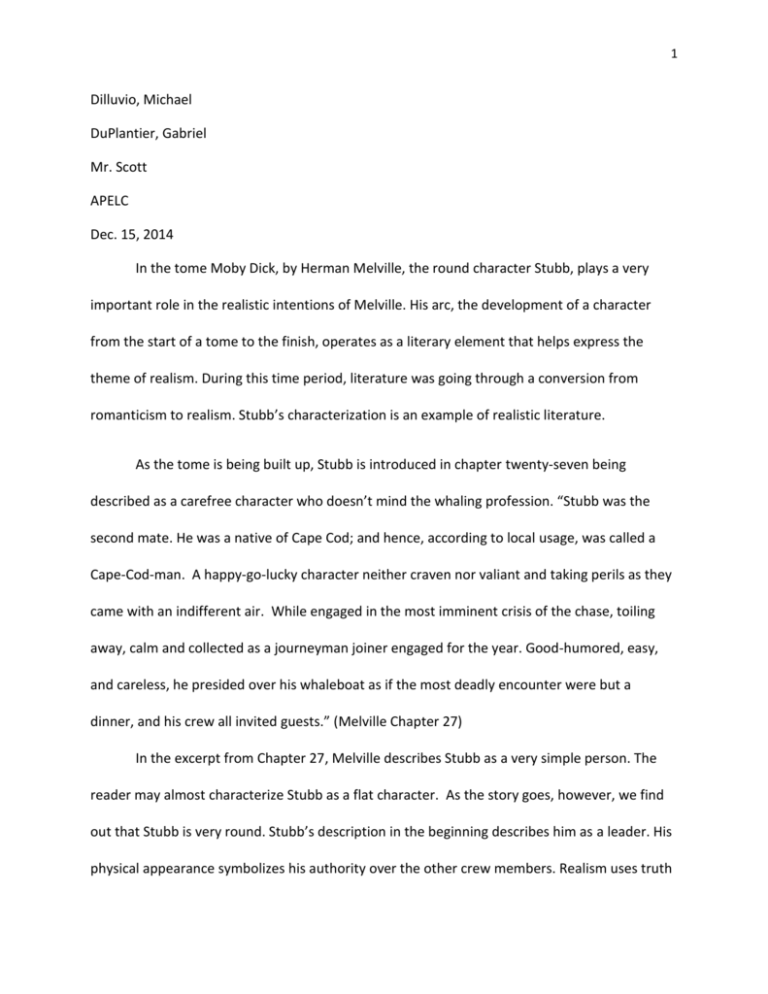
1 Dilluvio, Michael DuPlantier, Gabriel Mr. Scott APELC Dec. 15, 2014 In the tome Moby Dick, by Herman Melville, the round character Stubb, plays a very important role in the realistic intentions of Melville. His arc, the development of a character from the start of a tome to the finish, operates as a literary element that helps express the theme of realism. During this time period, literature was going through a conversion from romanticism to realism. Stubb’s characterization is an example of realistic literature. As the tome is being built up, Stubb is introduced in chapter twenty-seven being described as a carefree character who doesn’t mind the whaling profession. “Stubb was the second mate. He was a native of Cape Cod; and hence, according to local usage, was called a Cape-Cod-man. A happy-go-lucky character neither craven nor valiant and taking perils as they came with an indifferent air. While engaged in the most imminent crisis of the chase, toiling away, calm and collected as a journeyman joiner engaged for the year. Good-humored, easy, and careless, he presided over his whaleboat as if the most deadly encounter were but a dinner, and his crew all invited guests.” (Melville Chapter 27) In the excerpt from Chapter 27, Melville describes Stubb as a very simple person. The reader may almost characterize Stubb as a flat character. As the story goes, however, we find out that Stubb is very round. Stubb’s description in the beginning describes him as a leader. His physical appearance symbolizes his authority over the other crew members. Realism uses truth 2 rather than the ideal. Stubb’s honest description isn’t very heroic and this initial description allows Stubb to develop later on. During the middle of the tome, Stubb starts to show signs of complexity. As Stubb swears with the crew to kill the white whale, he starts to show signs of rebellion. One example of his conversion would be when Stubb eats his supper one night and his meat was not cooked well enough. "Cook," says Stubb, rapidly lifting a rather reddish morsel to his mouth, "don't you think this steak is rather overdone? You've been beating this steak too much, cook; it's too tender. Don't I always say that to be good, a whale-steak must be tough? There are those sharks now over the side, don't you see they prefer it tough and rare? What a shindy they are kicking up! Cook, go and talk to 'em; tell 'em they are welcome to help themselves civilly, and in moderation, but they must keep quiet. Blast me, if I can hear my own voice. Away, cook, and deliver my message. Here, take this lantern," snatching one from his sideboard; "now then, go and preach to them!" (Melville Chapter 64) Stubb goes from his normal state, which has stayed true throughout most of the tome, to almost a different character as he scolds the poor cook for not perfectly cooking his meal. Another example of Stubbs rebelling against Captain Ahab’s vision would be when Ahab decided that in order to keep order on the ship, the crew must collect right whales as well as sperm whales. "Wants with it?" said Flask, coiling some spare line in the boat's bow, "did you never hear that the ship which but once has a Sperm Whale's head hoisted on her starboard side, and at the same time a Right Whale's on the larboard; did you never hear, Stubb, that that ship can never afterwards capsize?" (Melville Chapter 73) Stubb, along with the crew, declares this question as blasphemy. Stubb even goes to the extreme by talking to Fedallah about a 3 possible kidnapping. During this time period, it was common for sailors to lose their composure on the sea. Almost like a thousand yard stare, sailors would suffer from exhaustion and stress and then often as a result they would lose their composure. This would be Melville incorporating realism into his writing leaving illusion out of it. When the crew finally catches up to Moby Dick, the crew loads into their boat to chase the whale down. “And Stubb did but speak out for well nigh all that crew. The frenzies of the chase had by this time worked them bubbling up, like old wine worked anew. Whatever pale fears and forebodings some of them might have felt before; these were not only now kept out of sight through the growing awe of Ahab, but they were broken up, and on all sides routed, as timid prairie hares that scatter before the bounding bison. The hand of Fate had snatched all their souls; and by the stirring perils of the previous day; the rack of the past night's suspense; the fixed, unfearing, blind, reckless way in which their wild craft went plunging towards its flying mark; by all these things, their hearts were bowled along. The wind that made great bellies of their sails, and rushed the vessel on by arms invisible as irresistible; this seemed the symbol of that unseen agency which so enslaved them to the race.” (Melville Chapter 134) Here Melville fully describes that the anger of Ahab had persuaded the crew, along with Stubb, to abandon their fears and share in his hateful revenge. Melville uses this to express the hatred that Captain Ahab has for the whale. Ahab’ hatred inspires the crew to go after the whale as well. Melville uses this to express the anger that a man has when revenge is present in him. As the tome played out, Stubb went from being a carefree sailor to disagreeing with his captain and finally a hate filled sailor who longs for the blood of Moby Dick. Instead of using symbols and mythical creatures, Melville uses truth by telling a story based on his past 4 experiences and the story of the Essics. Melville creates an eye -opening tome that changes the views of many on the whaling industry because he uses truth rather than ideas. 5 Bibliography Melville, Herman. "Moby-Dick; Or, The Whale." Home Page. American Liturature, n.d. Web. 13 Dec. 2014. <http://americanliterature.com/author/herman-melville/book/moby-dick-or-thewhale/summary>. Fleming, Grace. "How to Write a Character Analysis - Homework Help." About Education. Grace Fleming, n.d. Web. 15 Dec. 2014. <http://homeworktips.about.com/od/writingabookreport/a/characteranalysis.htm>. "History of Whaling." Whale Facts. Ed. Terrry Senate. Whalefacts.org, n.d. Web. 14 Dec. 2014. <http://www.whalefacts.org/history-of-whaling/>.
